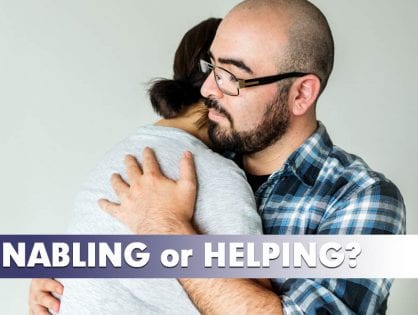Friends and family play a major role in recovery. A fine line can exist between helping and enabling:
Letting your teenage son/daughter “get away” with not doing chores because they have an exam can be helping.
Not acknowledging you son/daughter’s defiance, substance use and inappropriate behaviour by just saying “Kids will be kids, they’ll grow out of it” can be seen as enabling the negative behaviour.
Are you an Enabler?:
1) Do you ignore unacceptable behaviour?
2) Do you find yourself resenting the responsibilities you take on?
3) Do you put your own needs aside to help others?
4) Do you have trouble expressing your own emotions?
5) Do you fear a “blowup” if you confront a behaviour?
6) Do/Did you cover for someone’s mistakes?
7) Do you offer help when it is never appreciated or acknowledged?
8) Do you blame others for the problems rather than the one who is really responsible?
If you answered yes to those questions, you may in fact be enabling behaviours of a loved one that is struggling with an addiction.
Seeking information during recovery is important so you can help. Your program begins once the individuals completes program and returns home:
1) Don’t expect an immediate change. There is no “pill” to fix someone that has substance abuse issues. It takes time and you need to be patient.
2) Be observant, but not over bearing. Bringing concerns up over and over again will only stress the person out, create anxiety and increase the potential to relapse.
3) When seeing positive change, acknowledge the change to build confidence in the individual.
4) Listen to the person, you don’t always have to have an opinion. Many times people need to just “get things off their chest” in order to move forward.
5) Educate yourself regarding the specific substance and behaviours.
IMPORTANT POINTS TO REMEMBER:
- The person who left the program is not the same person that you have returning home.
- In time, positive re-enforcement will bring on confidence for the person you are trying to help.
- You need to identify that this will be a lifestyle change for the person and for yourself.
John
Lead Addictions Counsellor

